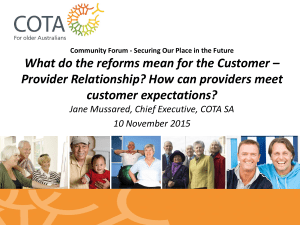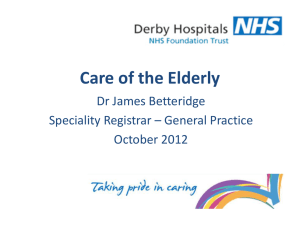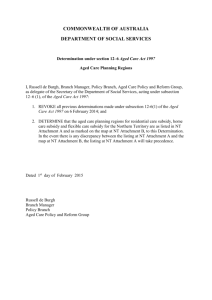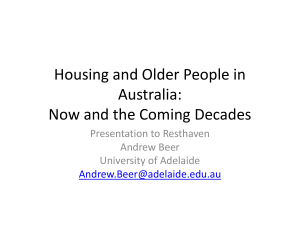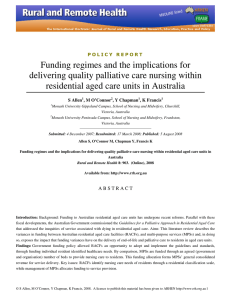Issue #18 of the Information for Aged Care Providers Newsletter
advertisement
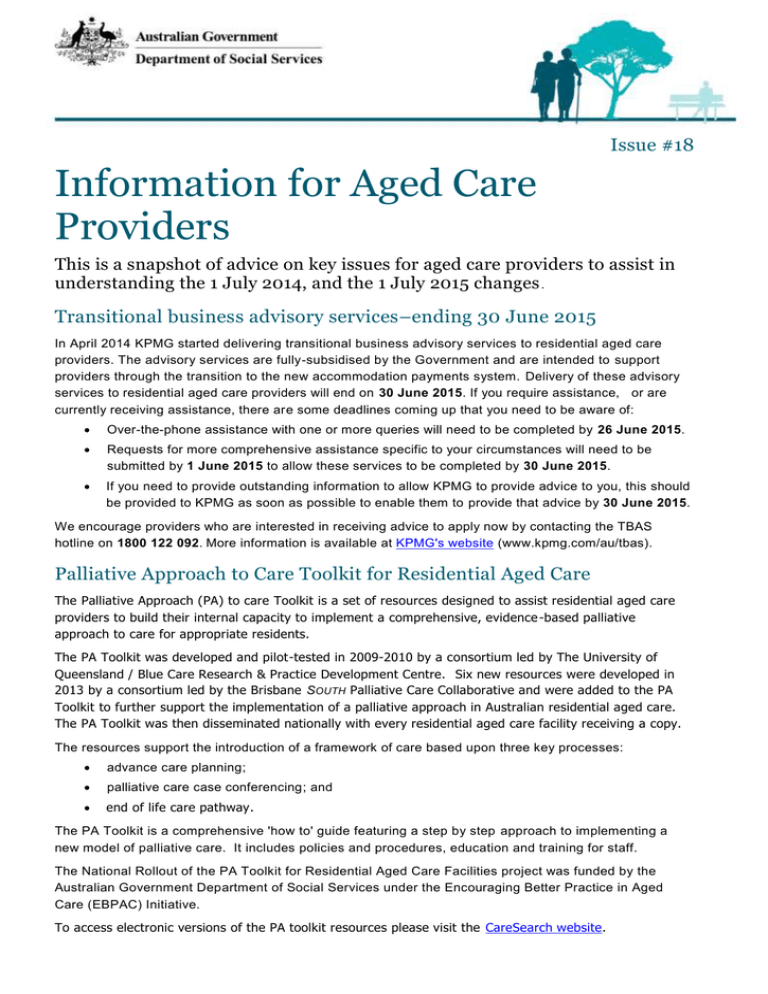
Issue #18 Information for Aged Care Providers This is a snapshot of advice on key issues for aged care providers to assist in understanding the 1 July 2014, and the 1 July 2015 changes . Transitional business advisory services–ending 30 June 2015 In April 2014 KPMG started delivering transitional business advisory services to residential aged care providers. The advisory services are fully-subsidised by the Government and are intended to support providers through the transition to the new accommodation payments system. Delivery of these advisory services to residential aged care providers will end on 30 June 2015. If you require assistance, or are currently receiving assistance, there are some deadlines coming up that you need to be aware of: Over-the-phone assistance with one or more queries will need to be completed by 26 June 2015. Requests for more comprehensive assistance specific to your circumstances will need to be submitted by 1 June 2015 to allow these services to be completed by 30 June 2015. If you need to provide outstanding information to allow KPMG to provide advice to you, this should be provided to KPMG as soon as possible to enable them to provide that advice by 30 June 2015. We encourage providers who are interested in receiving advice to apply now by contacting the TBAS hotline on 1800 122 092. More information is available at KPMG's website (www.kpmg.com/au/tbas). Palliative Approach to Care Toolkit for Residential Aged Care The Palliative Approach (PA) to care Toolkit is a set of resources designed to assist residential aged care providers to build their internal capacity to implement a comprehensive, evidence -based palliative approach to care for appropriate residents. The PA Toolkit was developed and pilot-tested in 2009-2010 by a consortium led by The University of Queensland / Blue Care Research & Practice Development Centre. Six new resources were developed in 2013 by a consortium led by the Brisbane SOUTH Palliative Care Collaborative and were added to the PA Toolkit to further support the implementation of a palliative approach in Australian residential aged care. The PA Toolkit was then disseminated nationally with every residential aged care facility receiving a copy. The resources support the introduction of a framework of care based upon three key processes: advance care planning; palliative care case conferencing; and end of life care pathway. The PA Toolkit is a comprehensive 'how to' guide featuring a step by step approach to implementing a new model of palliative care. It includes policies and procedures, education and training for staff. The National Rollout of the PA Toolkit for Residential Aged Care Facilities project was funded by the Australian Government Department of Social Services under the Encouraging Better Practice in Aged Care (EBPAC) Initiative. To access electronic versions of the PA toolkit resources please visit the CareSearch website. Information about the aged care entry process The Department of Human Services recently published information for residential and home care providers about the aged care entry process. The information is available at the Department of Human Services website: (www.humanservices.gov.au/health-professionals/services/aged-care-entry-requirements/). Home Care Packages update Creating an individualised budget With the introduction of Consumer Directed Care (CDC) to all home care packages from 1 July 2015, you will need to work in partnership with your consumers to co-design their care plan and individualised budget. The individualised budget allows both you and your consumer to see what care and services are being provided in their package and how much they cost. An individualised budget is made up of: Australian Government subsidy and any supplements The basic daily care fee An income-tested fee (if the consumer’s income is above the basic pension and they entered into a home care agreement on or after 1 July 2014) and, Any other amount the consumer has agreed to contribute. Monthly income and expenses statement Once service delivery has begun, you must provide a monthly statement to your consumer to show h ow their budget is being spent. The statement shows your consumer how their budget is tracking against their care and services and the balance of any funds remaining. Any unspent funds, m ust be rolled over from month to month and year to year for as long as the consumer remains in the package. You will need to ensure that your statements are in plain English and are set out in a simple and easy to understand format. Change to email communications from DSS The Department of Social Services is making some important changes to how we distribute government announcements that affect the aged care sector. Over the next six weeks, we will be transitioning to a new, industry standard email service, with the current system scheduled to be decommissioned on 30 June 2015. Benefits of the upgraded system include: Any interested parties may subscribe to aged care industry communications at any time. You may manage your own subscription preferences, or unsubscribe as desired. Messages will be delivered throughout the work day, not just at night. Reporting functions will help us to understand the information you need and improve the usefulness and relevance of messages we send you. No action is required now. More information will be provided in the next issue of this newsletter.
